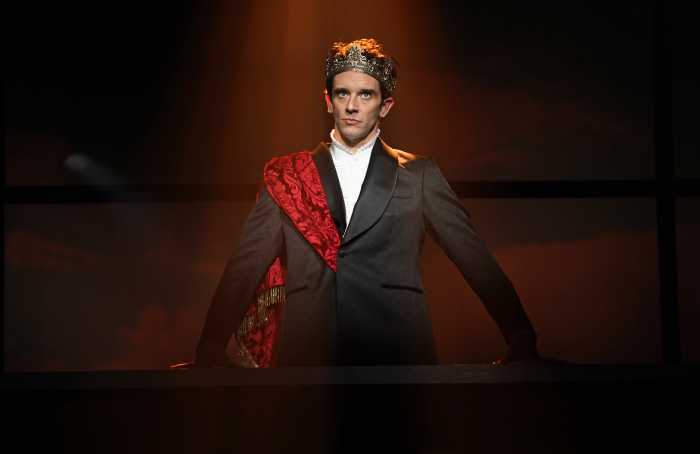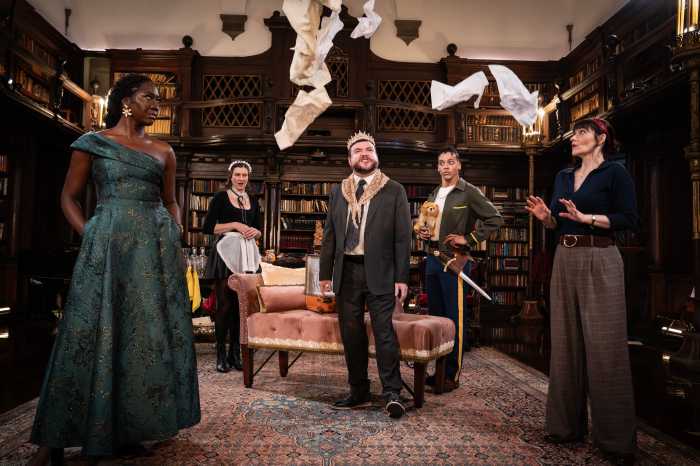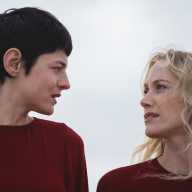Will somebody please, please give Mary Louise Parker a role that doesn't require her to perform it in an affectless, semi-catatonic whine? (That is, in addition to the kid-flick “The Spiderwick Chronicles,” in which she's marvelous as a mom surprised by the supernatural.) Parker's idiosyncratic performance style has been commoditized to the point where it loses its impact — in each incarnation it's basically the same thing in a different bottle.
Of course, semi-catatonic could just be her survival response to the dismally wretched “Dead Man's Cell Phone,” now at Playwrights Horizons. Sarah Ruhl's pathetic little comedy/fantasy strives to comment on the proliferation of cell phones amidst disconnectedness in today's culture. Instead, it's a malformed screed that trades in superficiality and stereotypes, while boring the audience to distraction.
DEAD MAN'S CELL PHONE
Playwrights' Horizons
416 W. 42nd Street
Tue.-Sat. at 8 p.m.; Sat., Sun.
at 2 p.m.; Sun. at 7:30 p.m.
$70; 212-279-4200
THE SEAGULL
Classic Stage Company
136 East 13th Street
Tue.-Sat. at 8 p.m.; Sat. at 2 p.m.;
Sun. at 3 p.m.
$70, $75; 212-352-3101
Parker plays Jean, a depressive with no life to speak of. In a café, she answers the incessantly ringing cell phone of a man, Gordon, who seems to be ignoring the ring, but, in fact, has died. Each time she answers Jean gets more and more involved with the dead man's family and his business in black market body parts. She also falls in love with his brother, Dwight, and cheats death.
“Dead Man's Cell Phone” a failed concept; “The Seagull” crashes.
Through it all, Jean, who really knows nothing about Gordon, manufactures lies to make the survivors feel as though he wasn't the disconnected prick he really was. Gordon, meanwhile, offers a long and pointless monologue about his life.
Ruhl seems to be saying that we are all disconnected, even though we are capable of being more connected than ever through cell phones. It's a trite and facile argument, the scenes ring hollow, and the relationships are undeveloped. The characters are equally undeveloped, as Dwight has a kind of Luddite devotion to paper, which prompts several unoriginal insights about how people relate.
Ruhl even stoops to one of the more tedious tricks of pseudo-comedy – putting a lot of vulgarity in the mouth of an old woman. Kathleen Chalfant plays Gordon and Dwight's silver-haired mother in a stylish suit with a drink in hand, and she curses a lot. Pardon me while I collapse, helpless with mirth.
The real tragedy is that the cast is quite good and watching Parker is always interesting even if what she's doing is nothing new. David Aaron Baker comes closest to being a real human as Dwight, and T. Ryder Smith is sharp as Gordon. It's a shame that Ruhl doesn't give them something more to do or that director Anne Bogart couldn't guide this into an even remotely interesting evening. It's just one missed connection after another.
The new production of “The Seagull” now at Classic Stage Company goes wrong right from the beginning. Chekhov, along with the great director and acting teacher Stanislavski, virtually introduced naturalism to the theater. “The Seagull” is so excessive in its personalities – though chronically short of incident – that the only way for it to work is to play it straight; the characters are by turns funny and, ultimately, tragic only if they are sincerely rendered. Chekhov's satire and trenchant observation of human failing must be allowed to speak through the script and the performances, rather than being imposed on it.
Under the direction of Viacheslav Dolgachev, there is nothing subtle or even believable about any of the characterizations. Every performance quickly becomes an assault on the audience and the irony that makes the play tick is subsumed in ridiculous histrionics. It doesn't help that the translation by Paul Schmidt introduces contemporary vernacular that is glaringly inappropriate for the 19th century costumes.
In fact, the production seems like “August: Osage County” on a Russian farm, where absurdity heaps on absurdity to create a sense of doom and spiritual decay. That's not how this play works, and presenting it as a high-pitched comedy of manners misses the entire point – the seething desperation, dashed hopes, denial, and self-destruction that are at the heart of this play.
What's entirely missing from this production is the solipsistic romanticism that motivates virtually every character in the piece. It drives Konstantin to write obsessively and badly, Nina to act, also badly, and Trigorin to fall for a woman half his age and fail at the affair. Chekhov's comedy, such as it is, comes through heartbreak and crushed dreams, the desolation of learning that one's reach far outruns one's grasp.
That is a humor that is rueful and bittersweet, not hysterical. Dolgachev misses all of this and runs roughshod over this delicate play, creating an evening that is quickly tiresome and tedious.
The actors, for the most part, are out of control, working in different styles, making the whole thing seem like scene study for an acting class.
Diane Wiest plays the aging actress Arkadina at a pitch reminiscent of Eva Gabor in “Green Acres.” The closest she ever comes to a real moment is when she and Trigorin, whom she has convinced to stay with her through emotional blackmail, laugh because they know exactly what each is up to. Mostly, though, Wiest poses and postures and loses the sense of impending disaster that comes with being a star past her prime.
Alan Cumming is actually very good as Trigorin, offering a contained and subtext-rich performance. At times he seems too contemporary, but he scales his performance to the tiny CSC space and gives a sense of the depth of the character. Trigorin, who writes low-brow stories for the masses, never comes to terms with his fame, and in his silly infatuation with Nina, the ingénue who runs away to go on the stage in pursuit of him. Cumming comes closest to developing the kind of character Chekhov intended.
The rest of the company is only adequate, but because there is no coherent directorial vision they are left flailing their ways through the parts.
It's a shame this production is so disappointing. In a world obsessed with fame, sex, and the self, “The Seagull” is particularly relevant. We should be touched and even laugh at ourselves in wry recognition. Instead, this production falls with a thud like the titular dead bird.



































